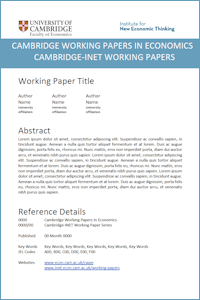
Gallo, E. and Langtry, A.
Social networks, confirmation bias and shock elections
WP Number: 2047
Abstract: In recent years online social networks have become increasingly prominent in political campaigns and, concurrently, several countries have experienced shock election outcomes. This paper proposes a model that links these two phenomena. In our set-up, the process of learning from others on a network is influenced by confirmation bias, i.e. the tendency to ignore contrary evidence and interpret it as consistent with one's own belief. When agents pay enough attention to themselves, confirmation bias leads to slower learning in any symmetric network, and it increases polarization in society. We identify a subset of agents that become more/less influential with confirmation bias. The socially optimal network structure depends critically on the information available to the social planner. When she cannot observe agents' beliefs, the optimal network is symmetric, vertex-transitive and has no self-loops. We explore the implications of these results for electoral outcomes and media markets. Confirmation bias increases the likelihood of shock elections, and it pushes fringe media to take a more extreme ideology.
Keywords: social learning, confirmation bias, network, elections, media
JEL Codes: C63 D72 D83 D85 D91 L15
Author links: Edoardo Gallo Alastair Langtry
PDF: wp2047.pdf 
Open Access Link: 10.17863/CAM.62312
